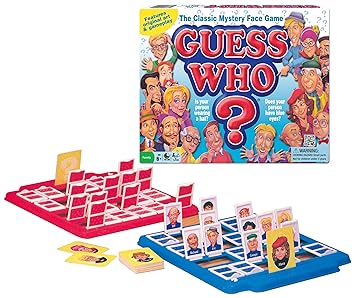It's a game I've both seen as part of training courses on specification ambiguity and something I would swear I invented when drunk once.
Do you remember Guess Who?
It's a game where players take turns asking yes/no questions about the appearance of the character on their opponent's card, aiming to be first to identify the character their opponent holds.
Shared Assumptions is a game where you play the same game with the same rules, except that you aren't allowed to ask anything about appearance. I've played this game with friends, with kids, with colleagues, with testers. It's great fun watching people use creative thinking to hack around the seemingly impossible rules. (Writing this reminds me of Nicola Sedgwick's awesome workshop on Gamification at TestBash 2015 - slides here)
If you've never played these rules, I truly encourage you to try this game.
In facilitating this game, I always emphasise that they're playing in a "safe place" because anything you say about a person's appearance must be based on some other characteristic, and so is by its nature, based on a social stereotype of a characteristic, and often a protected one, like age or gender.
Sometimes the results are simple and creative:
- remembers the "good old days"
- remembers the release of the first Godfather movie
- never worries about a bad hair day
- visits an opticians on a regular basis
Sometimes the results are plain odd:
- has large feet
- likes beach holidays
- allowed on a rollercoaster
- has experienced a significant life trauma
I've loved playing and facilitating this game, showing groups that in about two thirds of games there's no winner because the pair didn't share an assumption somewhere along the line.
Watching team members dissect where they went wrong and debate whose assumption was incorrect was great to watch. Of course it's an argument between adults over a children's game, but it also highlights the people who want to understand why they're not getting the best possible results.
There's loads of positives about playing this game in a work setting and the lessons it can teach you about teamwork and the lines of the specification that were only ever implied. The single greatest positive I've taken from this game is the look on my kid's face when he realised I get paid to play Guess Who.
Watching team members dissect where they went wrong and debate whose assumption was incorrect was great to watch. Of course it's an argument between adults over a children's game, but it also highlights the people who want to understand why they're not getting the best possible results.
There's loads of positives about playing this game in a work setting and the lessons it can teach you about teamwork and the lines of the specification that were only ever implied. The single greatest positive I've taken from this game is the look on my kid's face when he realised I get paid to play Guess Who.

No comments:
Post a Comment